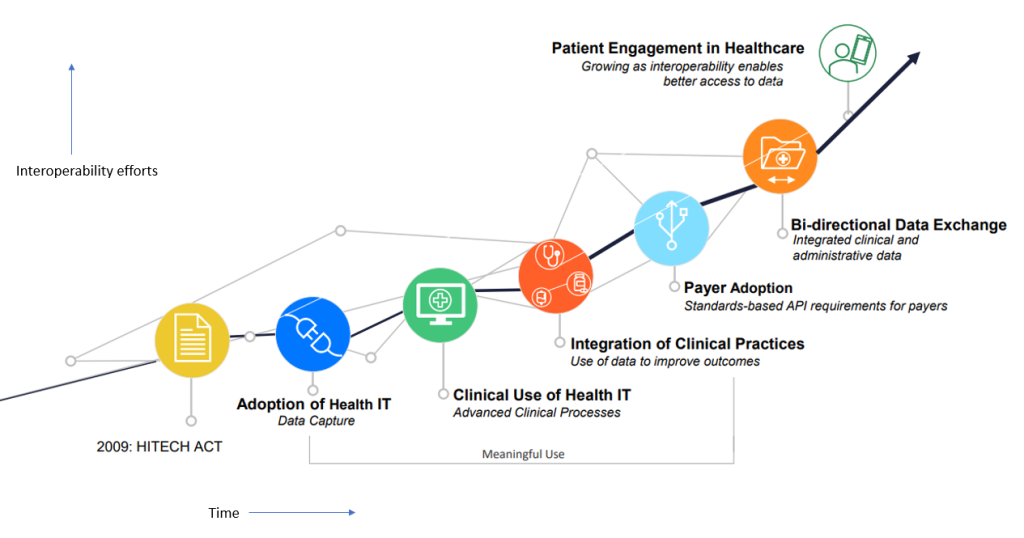Automation has revolutionized numerous industries, including healthcare. The CAQH 2022 index states that ‘increased automation and streamlined processes implemented so far have reduced the cost of our healthcare system by $187 billion annually’. In this blog, we explore the potential and challenges of automation in healthcare. As technology advances, healthcare providers are seeking ways to streamline operations, enhance efficiency, and elevate patient care. According to the CAQH index for 2022, the healthcare industry can save $2.5B by utilizing electronic claim submission, despite an 83% increase in spending on claim submissions.

Opportunities and Challenges in Healthcare Automation:
- Enhanced Efficiency: Streamline tasks like appointment scheduling and billing, saving time and minimizing errors.
- Improved Patient Care: Free healthcare professionals from routine tasks, enabling greater focus on individual patients, leading to better diagnoses, treatment plans, and outcomes.
- Data-Driven Insights: Automate data collection and analysis, offering valuable evidence-based insights for informed decision-making and practice optimization.
- Enhanced Patient Experience: Simplify patient interactions, from scheduling appointments online to seamless communication, improving satisfaction and engagement.
While the healthcare industry has continued to make progress automating administrative tasks, challenges still exist which impact provider burden and overall spend. Some of these challenges are:
- Data Security and Privacy: Protecting patient data becomes paramount, demanding robust cybersecurity measures to prevent unauthorized access or breaches.
- Workforce Adaptation: Shifting roles due to automation requires training and upskilling to leverage the benefits and address resistance.
- Integration and Interoperability: Integrating multiple systems and ensuring seamless data sharing across platforms like electronic health records (EHRs) demands standardized protocols.
- Ethical Considerations: Balancing AI algorithms, data privacy, and human judgment is vital to maintain patient trust and ethical integrity.
To help combat and address these challenges while adopting automation, stakeholders must collaborate on strategies to minimize increasing costs. Streamlining the administrative workflow to adapt to changing needs will help ease provider burden associated with completing these tasks, allowing for better and more accurate care coordination and quality of care for the patient. For example, CMS is utilizing the following plan to advance interoperability in the healthcare industry, leading to better patient engagement.
Advancing Interoperability in the Healthcare Industry – CMS’ Plan [2]

Healthtek’s Automation Solutions:
“There are 7,000 hospitals and hundreds of thousands of front-line clinicians in the U.S., and many are simply unable to keep pace with changes in technology and the regulatory guardrails,” said Mark Sendak, MD at the Duke Institute for Health Innovation [1].
Healthtek recognizes automation’s potential and addresses provider challenges with innovative tools. Notably, the EOB-835 Converter and Denial Manager are designed to enhance revenue cycle management.
- EOB-835 Converter: Automates EOB processing using AI to convert paper-based EOBs into digital 835-EDIs, reducing errors and expediting claims processing.
- Denial Manager: Leverages automation to manage claim denials, identifying patterns and root causes to enhance revenue recovery through optimized denial workflows.
To explore how Healthtek’s groundbreaking solutions, including the EOB-835 Converter and the Denial Manager, can optimize your operations, we invite you to request a demo. Witness firsthand how these innovations can enhance efficiency and streamline workflows within your organization. Reach out for a demo now and unlock the potential of a more efficient future.
Automation in healthcare offers substantial opportunities to improve efficiency, patient care, and outcomes. Embracing automation as a tool to augment human capabilities unlocks new levels of efficiency and patient-centric care.
References:
[1] https://www.ama-assn.org/practice-management/digital/health-care-ai-here-so-new-guidance-use-it-effectively
[2] https://www.cms.gov/about-cms/obrhi/interoperability/federal-interoperability


